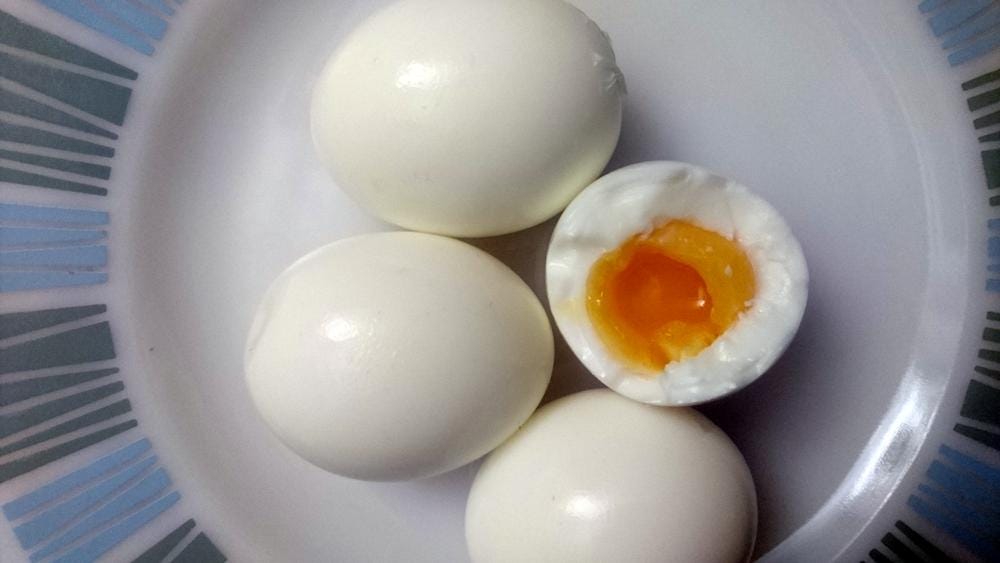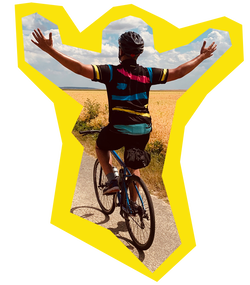Readiscovery
World Book Day, my writing toolbox, Thighs of Steel and the joys of egg boxing.
Happy Friday!
Welcome to another bright sunny day in Wonderland.* Today we have why reading Shakespeare’s plays is better than reading the Guardian and how eating too many eggs might give you (men) cognitive superpowers.
*Your mileage may vary. Enjoy the newsletter!

What the hell am I doing eating four soft boiled eggs at 10.30pm? Scroll down, down, down to the bottom of this email for the answer :)
Be more creative: read a book
Actor, comedian, dear friend and work colleague Beth Granville woke up on Sunday morning with a start: her alarm wasn’t ringing.
Fuck.
She had a sitcom recording to get to.
Fuck.
She grappled with her phone, eyes swimming in an abyss of darkness. An unresponsive power button; rising panic.
Luckily, it appeared that Beth’s phone was the sole victim of a vicious electromagnetic pulse attack, localised in the Wanstead area.
The rest of the capital’s telecommunications network and transport infrastructure was, thankfully, still working and Beth got to the recording studio just in time.
The only embarrassment, apart from losing the phone numbers of every comedy producer she’d met since 2018, came when Beth had to ask someone on the tube what the time was. Lucky not to be arrested, frankly.
But the black screen of death was the harbinger of an unexpected light.
Phoneless Beth picked up a book and finished it in two days.
~
As some of you know, over the last few months I've been much more deliberate about my reading.
Too much of my day is spent, not on my phone, but on my computer: either working or worrying that I should be working.
The computer, to me, symbolises the one true god of productivity. How poisonously wrongheaded!
This winter, I found a way around this awful bias, a way to trick myself into truly valuing the time I spend eyeballs deep in a book, without feeling guilty.
Today, I record focussed reading time as work time and ‘bill’ the hours in my working diary accordingly. (No one pays me, of course, at least not directly...)
I set my work timer for 45 minutes, sit down with a pile of sticky tabs and read, marking beautiful or fascinating passages and new words or concepts as I go.
As Beth discovered, and I readiscovered: reading is wonderful.
(Does ‘readiscovered’ work? Not sure. Let’s say yes.)
~
I’ve quoted Dr Ruth J Simmons before and I shall do so again:
If you enforce reading, you are likely to enforce time for reflection because it’s hard to read without reflecting … Busyness does not make our lives meaningful; it is the interior life that makes the greatest difference to us in the end.
Reading is restorative and relaxing in a way that computers or phones will never be.
At the end of my 45 minutes’ reading, I feel enriched in the equal and opposite way that I am exhausted by 45 minutes of browsing the same amount of material on the internet.
A couple of times this week I've even taken my book out to the pine woods near where I'm staying in Bournemouth, set up my hammock and gently swung through the pages for an hour or so. (Tuesday was interesting: sunshine and hail.)
This isn’t a lone response from someone who grew up reading.
Reading a book relieves stress, can help you empathise with others, and builds your vocabulary, which may help you manage your own mental health by giving you a larger palette of emotions.
Note: Fiction seems to offer more to our brains here than non-fiction.
Side note: Science fiction in particular might offer our brains something particularly valuable at the moment — the sense that the future is malleable and open to change.
~
Books also offer a counterpoint to the pell and mell of news, which I’ve written about and insulted before. As Marcel Proust said, long ago:
The fault I find with our journalism is that it forces us to take an interest in some fresh triviality or other every day whereas only three or four books in a lifetime give us anything that is of real importance.
One of my reading mentors, Ryan Holiday, deliberately weights his reading choices towards ‘timeless’ books.
‘I don’t want to read things that are very quickly proven irrelevant or incorrect,’ he says in an interview with Tim Ferriss (~1h51). He continues:
You’d be better off sitting down and reading Shakespeare’s plays because they have not only had 500 years of cultural impact, but will probably have 500 more years of cultural impact.
Think of what Ryan Holiday calls ‘the halflife of information’. The news that fires itself, cannon-like, out of your radio has a halflife of perhaps a day or two: tomorrow the triviality will be forgotten.
But a book has already proven itself durable: even a book published this year has probably been a couple of years in the making. If a reputable publisher was involved, the ideas and concepts are, if not timeless, then at least enduring.
~
Too many people write reading off as unproductive and it’s true that sitting down with your head in a book can look an awful lot like doing nothing.
Inside your skull, however, your brain is doing imaginative weight-lifting.
Reading strengthens language processing areas of the brain, as you might expect, but it is also a tremendously embodied experience: we truly live the novels we read.
Explaining the results of a study that showed long-term changes in brain connectivity among 21 people forced to read a Robert Harris novel, a team of neuroscientists from Emory University wrote:
It is plausible that the act of reading a novel places the reader in the body of the protagonist, which may alter somatosensory and motor cortex connectivity. … Reading stories … affect the individual through embodied semantics in sensorimotor regions.
Humans are wonderful fabulists: reading is the next best thing to being there.
Reading itself is a creative act. Of course, good books are full of good ideas and I can’t count the number of passages that have changed the way I write, permanently.
Last week’s newsletter, for example, was built entirely out of my reading from the week.
You’d expect reading to enhance creativity in writers, of course, but reading and writing themselves are significantly correlated with creativity.
It’s the same for Beth. I don't know what book she was reading, but when she saw this picture between its covers, she laughed out loud and added a caption that has done rather well on Twitter…
~
Next Thursday is World Book Day. Lots of places, like the National Trust, are putting on book-themed events, mostly for dratted kids.
World Book Day is not to be confused (as I always do) with World Book Night on 23 April.
Two whole festivals of books — eat my shorts, World Internet Day!
Think Bigger
As you might have noticed, I write a lot. A friend recently asked me for help building up his writing toolbox.
These are my regular hammers and spanners for writing:
Daily 1,000-word free writing sessions (ideally with a purpose, but always by habit)
Solitude (but not too much)
Collaboration (but not too much, see above)
Regular publication deadlines to despise
An audience (hi)
Reading (see top)
Conversation
Doing shit worth writing about…
Thighs of Steel: Selling out…
Weeks 8 and 9 have already sold out for Thighs of Steel 2020. If you’d like a piece of the cycling-fundraising-camping action, check details on the website and find the early bird links here.

Your neck of the woods?
I’m heading up to London for a couple of days of comedy writing and catching up with friends. Next week is all about clearing my desk before I dive into the woods for my first brush with bushcraft.
I thought I was the only person who did this with eggs. Turns out it’s got its own name and, doubtless before long, its own World Championships.
Much love,
dc:
CREDITS
David Charles wrote this newsletter. He publishes another newsletter about reading called Books Make Books. David is co-writer of BBC Radio Wales sitcom Foiled, and writes for The Bike Project, Forests News, Global Landscape Forum, Elevate and Thighs of Steel. He also edits books about adventure, activism and more. Reply to this email, or delve into the archive on davidcharles.info. Thank you for reading!
Unlock the commons for £30
These free weekly newsletters are currently 0.8 percent funded. You can unlock the commons for everyone by becoming a paying subscriber for £30 a year. Thank you.
Photo teaser answer: The eggs are packed full of cholesterol (about 800mg), which gets converted into testosterone in the early hours of the morning. No cholesterol, no testosterone. Am I trying for a baby? No. Am I taking part in a chest-hair-growing competition? No. Do I want to protect against cognitive decline, increase bone mineral density and fight off depression? Sounds eggcelent!



